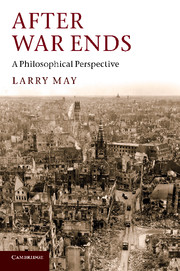Book contents
- Frontmatter
- Contents
- Acknowledgments
- Chapter 1 Introduction
- Part I Retribution
- Part II Reconciliation
- Part III Rebuilding
- Chapter 8 Responsibility to rebuild and collective responsibility
- Chapter 9 Responsibility to rebuild as a limitation on initiating war
- Part IV Restitution and reparation
- Part V Proportionality and the end of war
- Bibliography
- Index
Chapter 8 - Responsibility to rebuild and collective responsibility
Published online by Cambridge University Press: 05 June 2012
- Frontmatter
- Contents
- Acknowledgments
- Chapter 1 Introduction
- Part I Retribution
- Part II Reconciliation
- Part III Rebuilding
- Chapter 8 Responsibility to rebuild and collective responsibility
- Chapter 9 Responsibility to rebuild as a limitation on initiating war
- Part IV Restitution and reparation
- Part V Proportionality and the end of war
- Bibliography
- Index
Summary
At the beginning of the twenty-first century, a movement developed that conceptualized global justice in terms of the Responsibility to Protect. Most of the discussion about this idea has focused on intervention to thwart or prevent atrocities, fueled in large part by the failure of the international community to do anything to stop the genocides in Rwanda and the former Yugoslavia in the 1990s. But part of the United Nations mandate is also to help:
States build capacity to protect their populations from genocide, war crimes, ethnic cleansing, and crimes against humanity and to assisting those which are under stress before crises and conflicts break out.
It is this underexplored part of the Responsibility to Protect that will be the focus of this chapter. But I will also say quite a bit about the general idea of Responsibility to Protect, especially concerning its relationship to collective responsibility.
As in several earlier chapters, I will begin by looking to the Just War tradition for assistance in beginning to think about this complex idea. In particular, I will look to the work of Grotius and Vattel. Vattel is the best-known advocate of a responsibility to intervene but his work can also, I believe, easily support a responsibility to build, or rebuild, capacity to protect as well, as a general part of jus post bellum. I will then sketch several conceptual problems that Vattel’s approach elicits but does not clearly solve. In the end I will attempt to solve some of these problems, but two problems remain a major sticking point to the idea of a responsibility to build or rebuild the capacity to protect. As a result, we will find that some jus post bellum principles sit uncomfortably with other principles in the Just War tradition.
- Type
- Chapter
- Information
- After War EndsA Philosophical Perspective, pp. 145 - 162Publisher: Cambridge University PressPrint publication year: 2012

